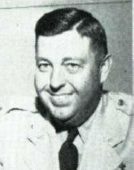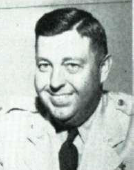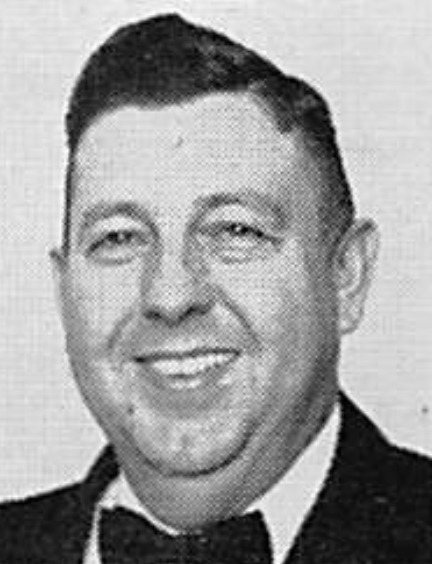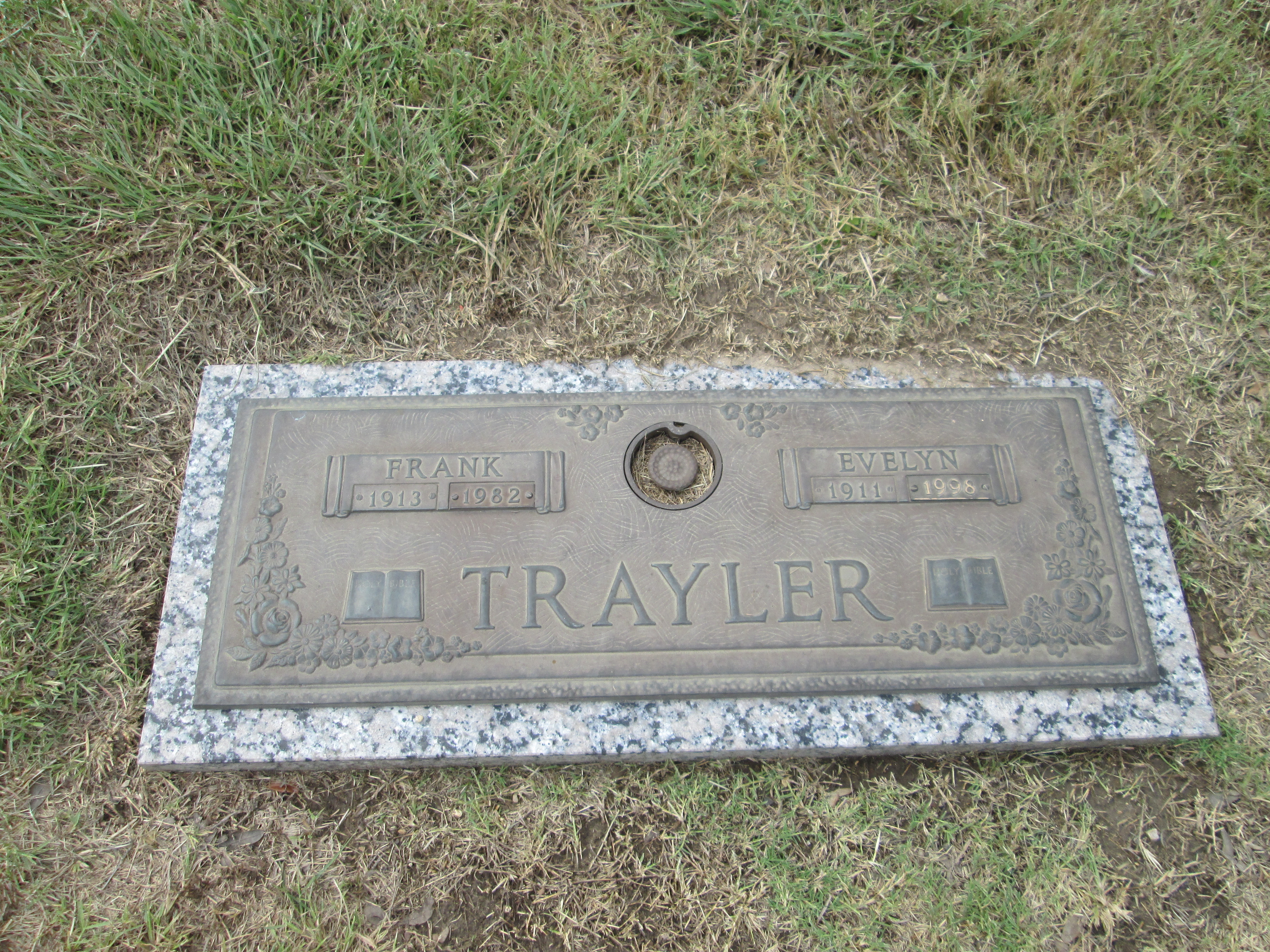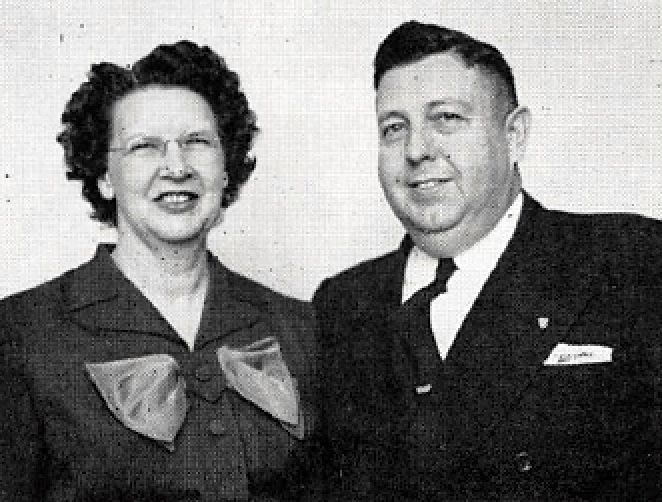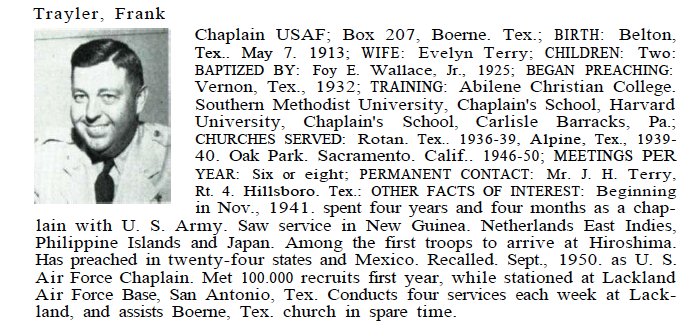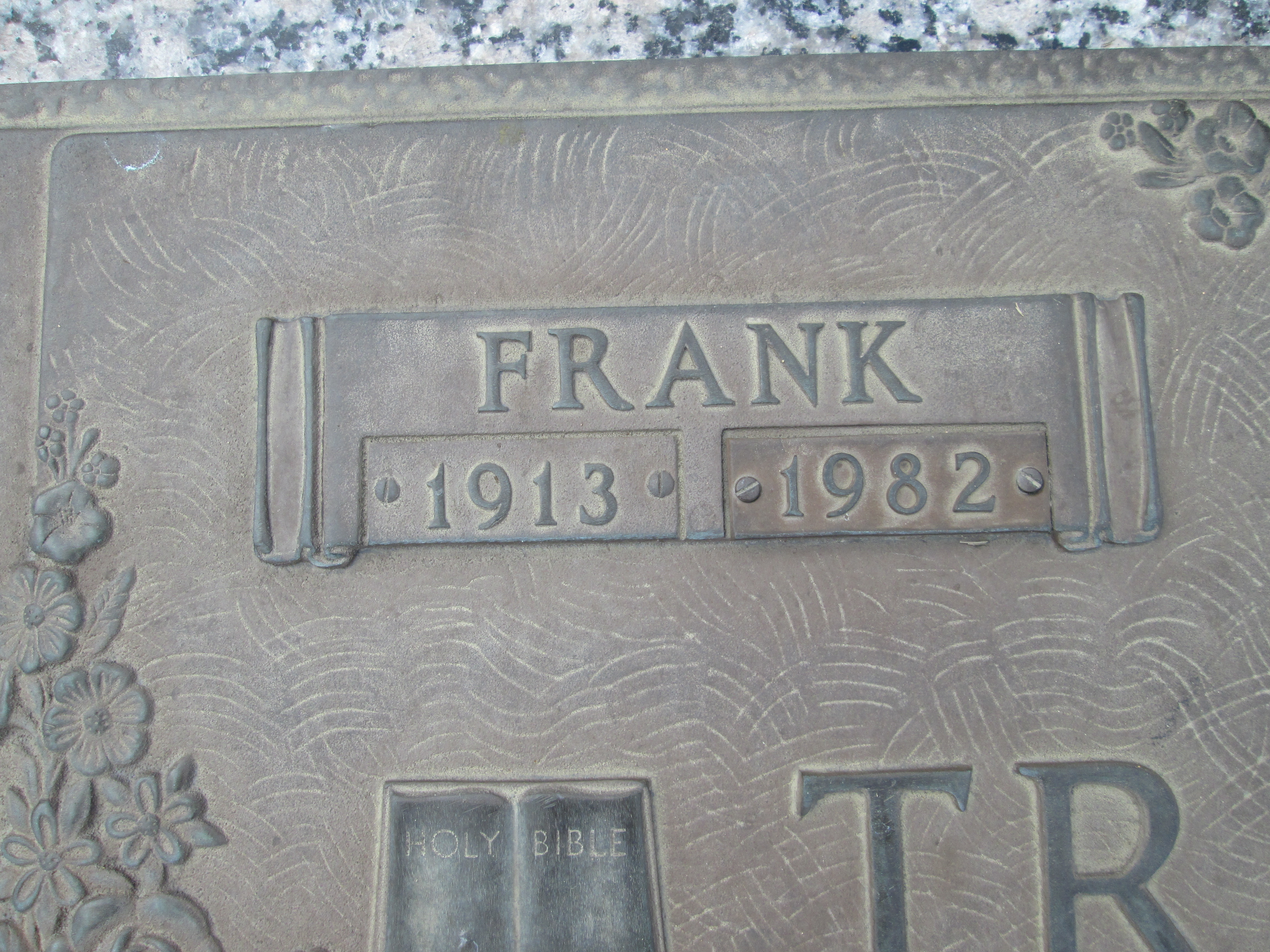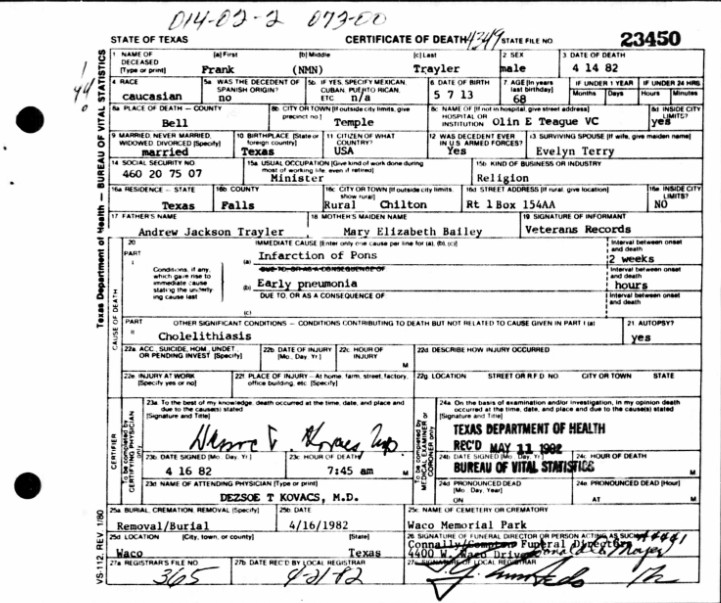There is no doubt that the chaplain most church members knew best during World War II was Frank Trayler, who served with such distinction all during the war, receiving from the government the Bronze Star for meritorious service. Possessing a penchant for record keeping, Trayler tabulated at the time he received the Bronze Star that he had completed thirteen years of continuous services in the churches of Christ. He had delivered 2,335 sermons in twelve states and other countries. He had distributed 10,000 tracts, 2,000 gospel papers, and had written 4,915 letters of condolences. In this period he had taught 951 Bible classes, made 343 visits to hospitals, and visited 5,883 sick. He had also made 64 visits to prisons and interviewed 1,401 people. He had baptized 391 people, restored 161, married 41 couples, and preached funerals for 93 people. [14] Trayler's life from the earliest days was intimately linked to Christian service. Born in Belton, Texas, on May 7, 1913, he was the son of the A. J. Traylers. His grandfather, J. S. Bailey, was an old-time Texas preacher. Trayler attended high school at Vernon, Texas and was baptized by Foy E. Wallace, Jr. at Belton. He entered Abilene Christian College in the fall of 1932, and graduated from there four years later. He met Evelyn Terry of Hillsboro, Texas at Abilene whom he shortly married. He preached his first sermon at Vernon, but after graduating from Abilene Christian, he preached three years at Rotan, Texas. Here his son, David Earl, was born in 1937. Trayler preached briefly at Alpine, Pecos, Levelland, and Dallas. He left school in 1934 to preach in Sanderson, Texas, but returned shortly to continue his education. Since he spoke Spanish fluently, he also devoted some of his time to preaching to Mexicans. Trayler saw the war coming, so on November 24, 1941, he entered the Chaplains' Corps and was assigned to Fort Leonard Wood, Missouri. [15] By the spring of 1943 Trayler was heavily entangled in duties with the First Battalion of the 20th Infantry Division at Camp San Luis Obispo, California. In mid-May he spoke to the largest crowd in his career, 1,024. During this period, he was continually baptizing soldiers from homes all over the nation. "Do you wonder why I am happy to be a chaplain?" he inquired. He was shortly transferred to a Field Artillery unit at Paso Robles and promoted to Captain. As the year passed Trayler performed chaplain's duties at Camp Roberts, California, conducting services in the East Garrison, giving weekly communion to two hundred soldiers of whom one hundred twenty-five were members of the church. He also found opportunity to extend his services in unique ways beyond the camp.
[14] Frank Trayler, "The Bronze Star," FF, 62 (Oct. 9, 1945), 10.
[15] James H. Childress, "Getting Acquainted With Our Preaching Brethren," Firm Foundation, 51 (March 16, 1934), 2; "Frank Trayler," Firm Foundation, 60 (Nov. 23, 1943), 6.
He organized eighty-five soldiers into a "Victory Chorus" and took twenty-five on one occasion to Armona, California, where they sang hymns a cappella in a school auditorium. On one occasion the room was packed with appreciative people with one hundred fifty standing in the halls unable to enter. The soldiers spent this day at a dinner on the ground, and in the evening Trayler spoke to an overflow crowd. He inquired about the church and discovered that a small congregation was meeting in the Women's Club Building Building, Thirteenth and Oak, in Paso Robles, and many of the soldiers were attending here on Sundays. Later in the year Trayler was transferred to New Guinea in the South Pacific where he soon discovered there were some zealous young Christian soldiers holding services in various places. Shortly after his arrival, Trayler's unit was in combat. He felt his prayers had been answered when there were very few casualties. Moreover, several of the boys were interested in the gospel, and several were studying the Book of Acts with him with the thought of obeying the gospel. Some who were members of the church had been in Australia, and they enjoyed telling Trayler how good the Australian Christians had been to them. Like all the American soldiers who were stationed far from home, Trayler faced moments when his spirits were at a low ebb. Near the close of each day in New Guinea, he walked down to the beach and fixed his melancholy look eastward and reflected that home was 10,000 miles away across the disturbed waters of the Pacific. On these occasions he uttered prayers for his work and for the brethren in the United States. As the months passed and the invasion of France seemed to signal that the end of hostilities was getting closer, Trayler was encouraged by so many of the young soldiers turning to Christ. A chaplain friend told him that he was surprised that several young men had come to him, wanting to be baptized and be members of one of the congregations of the churches of Christ. On one occasion Trayler wrote to the church in East Liverpool, Ohio, asking if a young soldier happened to be baptized upon a confession of his faith in Christ for the remission of his sins, would he be accepted by the churches. The terse reply was "yes". The dawn of the new year, 1945, found Trayler at Netherlands in the East Indies. Here he baptized Delbert Cypert, a nephew of Lillie Cypert. The young man's commanding officer had given him time off to attend services. When the war ended, Trayler went to the Philippine Islands where he found opportunities for Christian service. The army now recognized his meritorious service by giving him the Bronze Star, but for the moment Trayler was more concerned about the challenges about him. A congregation was established here among boys of the 41st Division. However, his work there was only one aspect of his service. He went out to the Sam Ramon Penal Farm each Wednesday and Friday nights where Timateo B. Almonte was preaching the gospel. Located fourteen miles from Zamboanga, there were two hundred fifty inmates to teach. When seventeen prisoners were baptized there on one Sunday, Trayler commented that Almonte was "surely an earnest and hard working servant of God." The war was over, however, and in October Trayler returned to the United States. --Earl West, Search for Ancient Order, pp. 335-337.
Frank Trayler, well-known and beloved gospel preacher for fifty years, departed this life on April 14, 1982 in Temple, Texas. He was born in Belton, Texas, on May 7, 1913. He and Miss Evelyn Terry were united in marriage on June 27, 1936. Brother Trayler received his B.A. Degree from Abilene Christian University in 1936 and his M.A. Degree from Pepperdine University in 1967. His preaching began in Vernon, Texas in February of 1932. Many of his brethren recently honored him with a special celebration for his fifty years of gospel preaching. This occasion of honor was in George West, Texas, where his last local ministry was fulfilled. Frank and Evelyn Trayler had just moved to Chilton, Texas. During the move he suffered a stroke and passed away a few days later in a hospital in Temple. Included among the local congregations he served are: Central, Sacramento, Calif., San Pedro, Calif., and Edinburg, Texas. Thirty-two of these fifty years were spent in the Sacramento area. Brother Trayler served thirteen years as Chaplain in the U.S. Army and U.S. Air Force. His dedication to the Cause of Christ included missionary labors in Germany, the Philippines and Caracas, Venezuela. There he also was a Bible Teacher in the Pan American College Bible Chair. In addition to his wife, Evelyn, who now resides in Chilton, Texas, his immediate survivors include one son, David, also of Chilton; one daughter, Mrs. Morris (Dorcas) Yates of Visalia, Calif.; nine grandchildren and four great-grandchildren. Commemorative tribute was paid by this writer in his funeral service at Connally-Compton West Chapel in Waco, Texas, on April 16, and burial was in Waco Memorial Park. Trine Starnes, P.O. Box 602, Waco, Texas 76703. ---Firm Foundation, May 18, 1982, p. 12 [312].
There is no doubt that the chaplain most church members knew best during World War II was Frank Trayler, who served with such distinction all during the war, receiving from the government the Bronze Star for meritorious service. Possessing a penchant for record keeping, Trayler tabulated at the time he received the Bronze Star that he had completed thirteen years of continuous services in the churches of Christ. He had delivered 2,335 sermons in twelve states and other countries. He had distributed 10,000 tracts, 2,000 gospel papers, and had written 4,915 letters of condolences. In this period he had taught 951 Bible classes, made 343 visits to hospitals, and visited 5,883 sick. He had also made 64 visits to prisons and interviewed 1,401 people. He had baptized 391 people, restored 161, married 41 couples, and preached funerals for 93 people. [14] Trayler's life from the earliest days was intimately linked to Christian service. Born in Belton, Texas, on May 7, 1913, he was the son of the A. J. Traylers. His grandfather, J. S. Bailey, was an old-time Texas preacher. Trayler attended high school at Vernon, Texas and was baptized by Foy E. Wallace, Jr. at Belton. He entered Abilene Christian College in the fall of 1932, and graduated from there four years later. He met Evelyn Terry of Hillsboro, Texas at Abilene whom he shortly married. He preached his first sermon at Vernon, but after graduating from Abilene Christian, he preached three years at Rotan, Texas. Here his son, David Earl, was born in 1937. Trayler preached briefly at Alpine, Pecos, Levelland, and Dallas. He left school in 1934 to preach in Sanderson, Texas, but returned shortly to continue his education. Since he spoke Spanish fluently, he also devoted some of his time to preaching to Mexicans. Trayler saw the war coming, so on November 24, 1941, he entered the Chaplains' Corps and was assigned to Fort Leonard Wood, Missouri. [15] By the spring of 1943 Trayler was heavily entangled in duties with the First Battalion of the 20th Infantry Division at Camp San Luis Obispo, California. In mid-May he spoke to the largest crowd in his career, 1,024. During this period, he was continually baptizing soldiers from homes all over the nation. "Do you wonder why I am happy to be a chaplain?" he inquired. He was shortly transferred to a Field Artillery unit at Paso Robles and promoted to Captain. As the year passed Trayler performed chaplain's duties at Camp Roberts, California, conducting services in the East Garrison, giving weekly communion to two hundred soldiers of whom one hundred twenty-five were members of the church. He also found opportunity to extend his services in unique ways beyond the camp.
[14] Frank Trayler, "The Bronze Star," FF, 62 (Oct. 9, 1945), 10.
[15] James H. Childress, "Getting Acquainted With Our Preaching Brethren," Firm Foundation, 51 (March 16, 1934), 2; "Frank Trayler," Firm Foundation, 60 (Nov. 23, 1943), 6.
He organized eighty-five soldiers into a "Victory Chorus" and took twenty-five on one occasion to Armona, California, where they sang hymns a cappella in a school auditorium. On one occasion the room was packed with appreciative people with one hundred fifty standing in the halls unable to enter. The soldiers spent this day at a dinner on the ground, and in the evening Trayler spoke to an overflow crowd. He inquired about the church and discovered that a small congregation was meeting in the Women's Club Building Building, Thirteenth and Oak, in Paso Robles, and many of the soldiers were attending here on Sundays. Later in the year Trayler was transferred to New Guinea in the South Pacific where he soon discovered there were some zealous young Christian soldiers holding services in various places. Shortly after his arrival, Trayler's unit was in combat. He felt his prayers had been answered when there were very few casualties. Moreover, several of the boys were interested in the gospel, and several were studying the Book of Acts with him with the thought of obeying the gospel. Some who were members of the church had been in Australia, and they enjoyed telling Trayler how good the Australian Christians had been to them. Like all the American soldiers who were stationed far from home, Trayler faced moments when his spirits were at a low ebb. Near the close of each day in New Guinea, he walked down to the beach and fixed his melancholy look eastward and reflected that home was 10,000 miles away across the disturbed waters of the Pacific. On these occasions he uttered prayers for his work and for the brethren in the United States. As the months passed and the invasion of France seemed to signal that the end of hostilities was getting closer, Trayler was encouraged by so many of the young soldiers turning to Christ. A chaplain friend told him that he was surprised that several young men had come to him, wanting to be baptized and be members of one of the congregations of the churches of Christ. On one occasion Trayler wrote to the church in East Liverpool, Ohio, asking if a young soldier happened to be baptized upon a confession of his faith in Christ for the remission of his sins, would he be accepted by the churches. The terse reply was "yes". The dawn of the new year, 1945, found Trayler at Netherlands in the East Indies. Here he baptized Delbert Cypert, a nephew of Lillie Cypert. The young man's commanding officer had given him time off to attend services. When the war ended, Trayler went to the Philippine Islands where he found opportunities for Christian service. The army now recognized his meritorious service by giving him the Bronze Star, but for the moment Trayler was more concerned about the challenges about him. A congregation was established here among boys of the 41st Division. However, his work there was only one aspect of his service. He went out to the Sam Ramon Penal Farm each Wednesday and Friday nights where Timateo B. Almonte was preaching the gospel. Located fourteen miles from Zamboanga, there were two hundred fifty inmates to teach. When seventeen prisoners were baptized there on one Sunday, Trayler commented that Almonte was "surely an earnest and hard working servant of God." The war was over, however, and in October Trayler returned to the United States. --Earl West, Search for Ancient Order, pp. 335-337.
Frank Trayler, well-known and beloved gospel preacher for fifty years, departed this life on April 14, 1982 in Temple, Texas. He was born in Belton, Texas, on May 7, 1913. He and Miss Evelyn Terry were united in marriage on June 27, 1936. Brother Trayler received his B.A. Degree from Abilene Christian University in 1936 and his M.A. Degree from Pepperdine University in 1967. His preaching began in Vernon, Texas in February of 1932. Many of his brethren recently honored him with a special celebration for his fifty years of gospel preaching. This occasion of honor was in George West, Texas, where his last local ministry was fulfilled. Frank and Evelyn Trayler had just moved to Chilton, Texas. During the move he suffered a stroke and passed away a few days later in a hospital in Temple. Included among the local congregations he served are: Central, Sacramento, Calif., San Pedro, Calif., and Edinburg, Texas. Thirty-two of these fifty years were spent in the Sacramento area. Brother Trayler served thirteen years as Chaplain in the U.S. Army and U.S. Air Force. His dedication to the Cause of Christ included missionary labors in Germany, the Philippines and Caracas, Venezuela. There he also was a Bible Teacher in the Pan American College Bible Chair. In addition to his wife, Evelyn, who now resides in Chilton, Texas, his immediate survivors include one son, David, also of Chilton; one daughter, Mrs. Morris (Dorcas) Yates of Visalia, Calif.; nine grandchildren and four great-grandchildren. Commemorative tribute was paid by this writer in his funeral service at Connally-Compton West Chapel in Waco, Texas, on April 16, and burial was in Waco Memorial Park. Trine Starnes, P.O. Box 602, Waco, Texas 76703. ---Firm Foundation, May 18, 1982, p. 12 [312].
Family Members
Sponsored by Ancestry
Advertisement
Records on Ancestry
Advertisement
